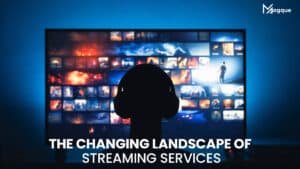Outline of the Article
- Introduction
- Understanding Streaming Devices
- The Rapid Evolution of Technology
- Operating System Updates
- Hardware Limitations
- The Role of Manufacturers
- Software and App Compatibility
- The Rise of 4K and 8K Content
- The Impact of Streaming Services
- Consumer Demand for New Features
- Environmental Concerns
- The Financial Aspect
- Upgrading vs. Replacing
- Sustainability and E-Waste
- Conclusion
Why Do Streaming Devices Become Outdated
In the ever-evolving world of technology, streaming devices have become an integral part of our entertainment ecosystem. From the early days of simple set-top boxes to today’s cutting-edge media players, the pace of technological advancement has been astounding. This article explores the various factors contributing to the obsolescence of streaming devices, the impact on consumers, and the choices they face.
Understanding Streaming Devices
Why Do Streaming Devices Become Outdated are the gateway to the digital content universe. They allow us to access movies, TV shows, music, and more via the internet. Examples include Roku, Apple TV, Amazon Fire Stick, and Google Chromecast. These devices have transformed how we consume media, offering convenience and a wide variety of content.
The Rapid Evolution of Technology
One primary reason streaming devices become outdated is the rapid evolution of technology. The digital world is in a constant state of flux, with new standards, formats, and technologies emerging regularly. As a result, older devices may struggle to keep up with the demands of modern media consumption.
Operating System Updates
Manufacturers regularly release updates for the operating systems that power these devices. While these updates often bring new features and improved security, older hardware may struggle to run them efficiently. This can lead to performance issues and a reduced user experience.
Hardware Limitations
Streaming devices, like any technology, are limited by their hardware capabilities. Over time, the demand for higher resolution and more immersive audio places strain on older hardware. 1080p was once the gold standard, but now 4K and even 8K content is becoming common. Older devices may not support these formats, making them less appealing to users.
The Role of Manufacturers
Manufacturers play a significant role in the lifecycle of streaming devices. They must decide when to discontinue support for older models to focus on newer products. This often means that software updates and security patches stop coming, leaving users with devices that become less secure and compatible over time.
Software and App Compatibility
Streaming devices rely on apps and services to deliver content. Over time, developers may optimize their apps for newer hardware and operating systems, leaving older devices with a subpar experience. This lack of compatibility can be frustrating for users.
The Rise of 4K and 8K Content
The demand for higher-quality content is pushing the boundaries of streaming technology. While 1080p HD was once the pinnacle, 4K and 8K content is now becoming the norm. Older devices may not have the necessary hardware or processing power to handle these resolutions effectively.
The Impact of Streaming Services
Streaming services continuously evolve and update their platforms. This can mean that older devices are no longer able to access these services, forcing users to upgrade or miss out on new content.
Consumer Demand for New Features
Consumers often crave new features and functionality. This drives manufacturers to innovate and release newer devices with enhanced capabilities. As a result, older models can quickly become outdated in terms of features and user experience.
Environmental Concerns
The disposal of electronic waste, including outdated streaming devices, has become an environmental concern. As more and more devices are replaced, the impact on the environment grows. This raises questions about sustainability and the need for more eco-friendly solutions.
The Financial Aspect
Upgrading streaming devices can be expensive, especially when considering the subscription fees for streaming services. Consumers must weigh the financial burden against the desire for enhanced performance and features.
Upgrading vs. Replacing
When a streaming device becomes outdated, users face a choice: upgrade or replace it. Upgrading may involve purchasing a newer model from the same manufacturer, while replacing means switching to a different brand or type of device. Both options come with their own pros and cons.
Sustainability and E-Waste
The ever-increasing turnover of electronic devices contributes to electronic waste (e-waste) concerns. Proper disposal and recycling of outdated streaming devices are essential for mitigating their environmental impact.
Conclusion
In conclusion, streaming devices become outdated due to a combination of factors, including rapid technological evolution, hardware limitations, manufacturer decisions, and the insatiable appetite of consumers for new features and content. This dynamic landscape forces users to make choices based on their needs, desires, and environmental concerns. Whether it’s upgrading or replacing, the world of streaming devices continues to evolve. Visit Here :- Google Accounts Use Passkeys By Default
FAQs
-
How Often Should I Replace my Streaming Device?
The timing for replacing your streaming device depends on your specific needs and the device’s performance. On average, every 3-5 years is a reasonable timeframe to consider an upgrade. -
Can I Still use my Outdated Streaming Device?
Yes, you can still use an outdated device, but you may experience limitations in terms of performance and compatibility with newer apps and content formats. -
Are There any Eco-Friendly Options for Disposing of Outdated Streaming Devices?
Yes, many electronics recycling programs accept outdated streaming devices. Be sure to check your local options for responsible disposal. -
What are the Benefits of Upgrading a Streaming Device?
Upgrading a streaming device can provide access to newer features, better performance, and compatibility with the latest content and apps. -
Is there a way to Extend the Lifespan of my Streaming Device?
Keeping your device’s software up to date and following manufacturer recommendations for maintenance can help extend its lifespan, but eventually, hardware limitations may catch up.













